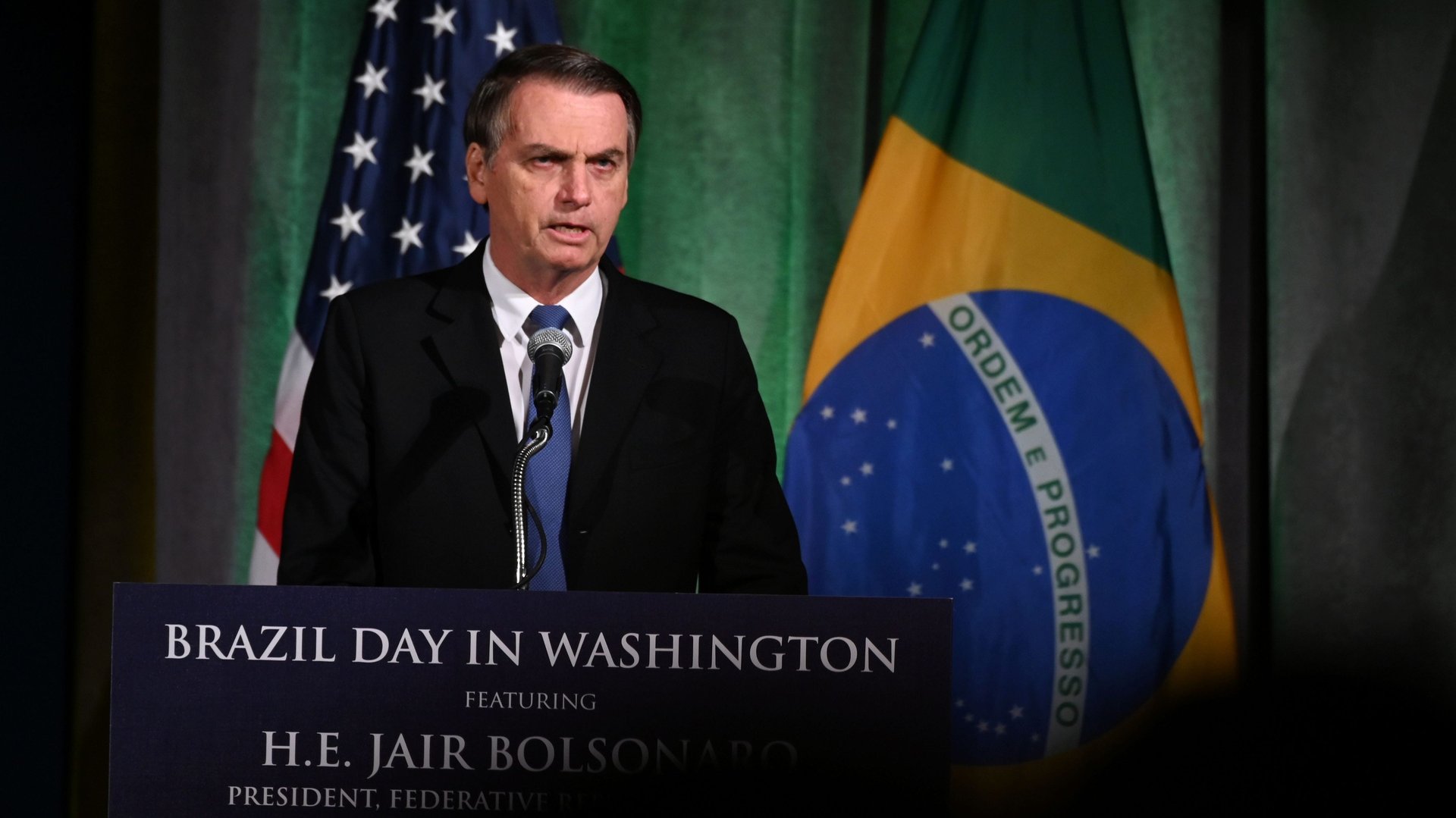Trump’s Washington rolls out the red carpet for Brazil’s Bolsonaro
The Hall of Flags at the US Chamber of Commerce headquarters in Washington, DC looks a bit like the home of a very upscale Renaissance fair.


The Hall of Flags at the US Chamber of Commerce headquarters in Washington, DC looks a bit like the home of a very upscale Renaissance fair.
The ceilings are crossed with ornately painted wood beams, the walls festooned with medieval banners representing the European Christian explorers (Columbus, Cabot, Ponce de Leon, Cortez, etc.) who colonized the Americas. It seemed a natural place for some of DC’s intelligentsia to welcome Brazilian president Jair Bolsonaro, nicknamed the “Trump of the tropics” for his conservative Christian beliefs, praise of military dictatorship, and attacks on the media, women, gay rights, and indigenous populations.
Ahead of a formal visit with Donald Trump at the White House today on March 19, Washington think tanks and lobbying groups rolled out the red carpet for Bolsonaro. Besides the half-day event at the Chamber of Commerce, dubbed “Brazil Day,” his visit included a “welcoming” dinner at the Brazilian ambassador’s residence with former Trump White House advisor Steve Bannon, interviews with Trump-supporting Fox News and the Christian Broadcasting Network, and a visit to the Central Intelligence Agency’s headquarters in Virginia. His long visit with Trump was capped by a Rose Garden press conference.
Since his swearing in on Jan. 1, Bolsonaro has seized land rights from hundreds of indigenous tribes living in Brazil’s rainforests, declared Brazil a “Christian nation” despite the country’s constitutional separation of church and state, and removed LGBT rights from human-rights protections. His son is ensnared in a corruption probe, and Bolsonaro’s family has been linked with the killer of liberal politician Marielle Franco and other paramilitary gangs. Activists warn his presidency is a massive threat to human rights and free speech.
A big business embrace
Executives from the US’s largest companies, including Boeing and Citigroup, warmly welcomed Bolsonaro and his ministers in the chamber hall on March 18.
“It is so important that we finally get this relationship right,” Jane Fraser, CEO of Citigroup Latin America said in introducing Bolsonaro. “President Bolsonaro has made it his number-one priority to improve his relationship with the US,” she said, delightedly. Financial-services companies like Citigroup are eager to benefit from the promised privatization of Brazilian social-safety nets, while agricultural companies see business growth in newly opened rainforest areas.
Like many others in the room, Citigroup’s embrace of the Brazilian leader contradicts its positioning at home: On March 15, Citigroup touted its support of the US “Equality Act,” a bill that would tweak US civil-rights laws to explicitly include “sexual orientation and gender identity” as protected characteristics.
Bolsonaro’s ministers gave chilling hints of changes ahead.
“For 30 years we have had a liberal globalized economy, which lies on top of a total absence of values, or what is called political correctness, and this is not working,” foreign minister Ernesto Araujo told the crowd. He promised a new “open society” built on “conservative values,” in which a “community is built by mutual trust, not just the accident of being together.” The statement seemed to hint at reordering of Brazil’s society along the lines of religion, or race, or…something else.
What, exactly, did he mean? The audience never found out. The chamber’s head of international affairs, Myron Brilliant, limited his interview to questions like “What would make this trip a success?” and “How can the business community help you?”
Later, Araujo promised a new Brazil where citizens “come together around their fatherland,” a phrase with echoes of Nazi Germany. Economic minister Paulo Guedes, meanwhile, praised Bolsonaro’s willingness to cut social-security benefits that many of Brazil’s 210 million people expect to rely on for retirement. “Nobody had the balls to control public spending, but we got a guy that has balls,” Gueddes said, prompting a titter in the room.
Bolsonaro’s vision of heaven
Bolsonaro was last to speak, and he was the most direct about the new Christian values he thinks are ascendent in Brazil.
“I believe that our government has come through the hands of God,” Bolsonaro said, according to a live translation from Portuguese (his actual meaning seemed to be closer to “God is responsible for my election”), citing his recovery from a stabbing early in the race. Thanks to “votes cast by conservatives who believe in God,” he said, he won, and despite the “fake news against us.”
His campaign was based on the Bible’s John 8:32, Bolsonaro noted: “You shall know the truth and the truth shall free you.”
“I am here, reaching out,” he said. “I think Trump is going to do this tomorrow just as much.”
Just before he spoke, optimistic Trump officials were briefing reporters on opportunities ahead. “Even the friendliest of Brazilian governments was never that friendly,” a senior White House official said on a press call. “Now we have a government of Brazil we can truly consider an ally.”
After the chamber event, business executives in the grand hall meandered out, outwardly unperturbed by Bolsonaro’s diatribe against freedom of the press or his disregard for the constitutional separation of church and state. After all, they hear more direct attacks on democratic norms and concepts enshrined in the US constitution on a regular basis, from the occupant of the White House just a few blocks away.
Justin Rohrlich contributed reporting.